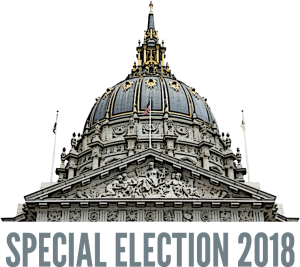City Hall
Finally, Data Map S.F. City Hall’s Progressive-Moderate Divide
Exclusive: A data-driven analysis has, at last, mapped the progressive-moderate divide at San Francisco City Hall that political observers have known in their guts for years.
San Francisco Public Press (https://www.sfpublicpress.org/series/june-2018-special-election)
On June 5, San Francisco voters will choose the city’s fourth mayor in six months, ending a period of upheaval in local politics after the death of Mayor Ed Lee in December. The stakes are high and the choices are stark: Four major candidates have distinguished themselves on a political spectrum running from “progressive” to “moderate.” Voters, meanwhile, are focused on the hot-button issues of housing affordability and homelessness.

The Public Press is profiling all eight mayoral candidates. Sharp edges have emerged from differing solutions to the housing crisis, endorsements by Big Tech and the sticky issue of identity — racial, gender and sexual orientation. Our coverage includes Proposition F (legal help for evictions) and the unusually contentious Superior Court races.
ABOUT THIS REPORTING PROJECT
REPORTING: Noah Arroyo, Joe Eskenazi, Andrew Stelzer and Rob Waters | EDITING: Michael Winter | COPY EDITING: Sherman Turntine | GRAPHICS: Reid Brown | PHOTOGRAPHY: David Zlutnick / KALW Crosscurrents, Noah Arroyo and Terry Pon | ONLINE: John Angelico
This project was made possible by donations from Public Press members and the San Francisco Foundation
Exclusive: A data-driven analysis has, at last, mapped the progressive-moderate divide at San Francisco City Hall that political observers have known in their guts for years.
In her bid to reoccupy the mayor’s seat she held briefly after Ed Lee died, London Breed lists a bevy of accomplishments and proposals in the realms of housing and homelessness. In many cases, the Board of Supervisors president openly states that she did — or would, if elected — play a support role to craft or implement city policy. For other initiatives and proposals, Breed’s ownership is undeniable. Last in a series analyzing the eight mayoral candidates’ records and pledges on housing and homelessness.
Three of the eight candidates for mayor answered our policy questions and offered feedback. The questionnaire was inspired by an analysis of key political issues that have come before the Board of Supervisors.
San Francisco mayoral candidate Michelle Bravo wants to win, but that is not her first priority. A political neophyte, the holistic-health practitioner admits she has much to learn — in fact, her main reason for entering the race was to get a crash course in the local issues. Seventh in a series analyzing the mayoral candidates’ records and pledges on housing and homelessness.
Exclusive: The San Francisco Public Press partnered with faculty at the University of California, Davis, to produce a unique questionnaire — inspired by an analysis of the key political issues that have come before the city’s legislators.
Ellen Lee Zhou has a plan to help end San Francisco’s homelessness crisis. And it could involve you. Zhou, a public-health worker, said that if elected mayor, she would pay homeowners monthly stipends to house and mentor some of the city’s estimated 4,300 unsheltered residents. Interested? Sixth in a series analyzing the mayoral candidates’ records and pledges on housing and homelessness.
Once a Democrat, Richie Greenberg realized he was “in the wrong party” after failing in his 2015 bid for District 1 supervisor. Today, in a city where just 7 percent of registered voters are Republicans, he’s the odd man out in the mayor’s race as the only GOP candidate. “We don’t need activists leading this city,” he said. “We need leaders.” Fifth in a series analyzing the mayoral candidates’ records and pledges on housing and homelessness.
Amy Farah Weiss, founder of Saint Francis Homelessness Challenge, is an extra-long longshot to be elected the city’s 44th mayor. In her second bid for City Hall, what she is doing is putting forward a detailed and wonky set of proposals for tackling core issues — and trying to impart a sense of urgency. Fourth in a series analyzing the mayoral candidates’ records and pledges on housing and homelessness.
Angela Alioto points to 10-year plan to abolish chronic homeless she crafted in 2004 as a model of success that the city needs to revive. She blames the late Mayor Ed Lee for letting the plan wither and siphoning away money for other programs. Third in a series analyzing the mayoral candidates’ records and pledges on housing and homelessness.
District 6 Supervisor Jane Kim represents the city’s wealthiest and poorest ZIP codes. She has focused much of her political energy on inclusionary housing — programs mandating a percentage of apartments in new developments be set aside at below-market rates — and set a new standard by securing higher-than-normal affordability ratios on several mega-projects. On homelessness, she says that if elected mayor, she would treat it more like a public health crisis than an economic problem. Second in a series analyzing the mayoral candidates’ records and pledges on housing and homelessness.